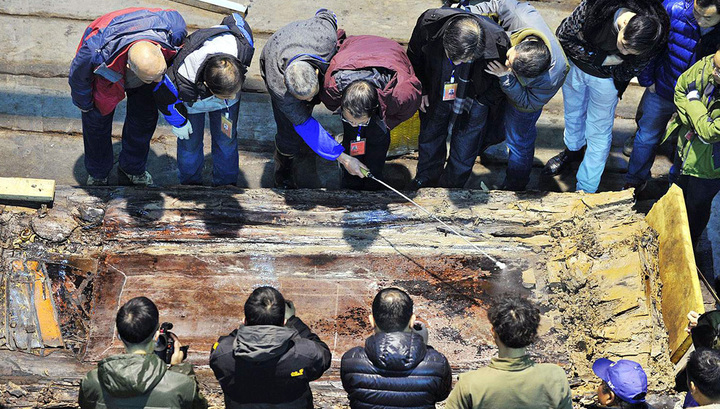Confucius's lost sayings are found in a tomb of the governor of Heavenly Empire
of the Chinese archeology less than hundred years. Probably, the improbable amount of archaeological sensations a sort from Heavenly Empire also is explained by it: there not all dug out.
Quite recently, in 2011, near Nanchang in the southeast China found an ancient necropolis. The similar find somewhere in would become an event of century, and for China it only "one of 10 outstanding archaeological opening of the beginning of the XXI century". But the rank of opening can raise to "epoch-making" soon.
Present scales: Haihunhou's necropolis is eight tombs and separate burial of vehicles (five chariots, everyone is harnessed by four horses). The necropolis area – 40 thousand sq.m. In five years of excavation about 20 thousand artifacts, among which – centner gold and tons of bronze coins, gold ingots in the form of horse hoofs, jade jewelry, the musical instruments, the most ancient in China the distillation device for receiving alcohol, library and archive of documents on 5000 bamboo plates were found … The list far not full, besides in process of excavation archeologists add in it hundreds new positions annually.
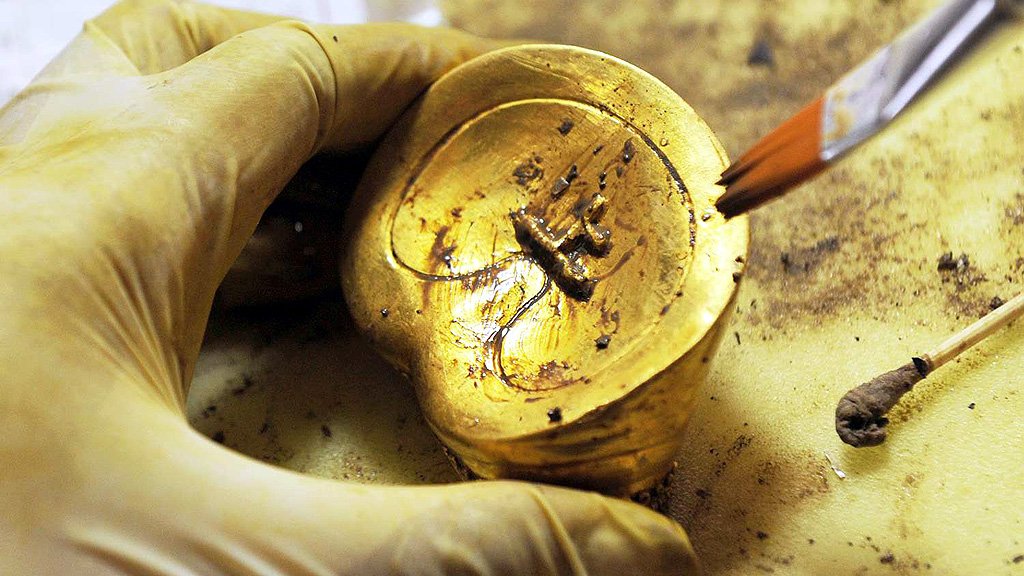
Cleaning of a gold ingot in the form of the horse hoof found in a tomb of Haihunhou. Photo: Xinhua
Archeologists without effort defined that burials belong to a dynasty era the Western Han (206 B.C. – the 9th year of our era), and concentrated efforts on the main tomb of a necropolis of Haihunhou. Guesses concerning the identity of her owner completely were confirmed in 2015 when the nominal press of the dead was found. Haihunhou – not the district name, this direct instruction on a certain person: Howe (prince) of destiny of Haihun which is better known as emperor Liu He.
Liu He's– extremely interesting personality: neither to, nor after there was in Heavenly Empire no the person who was in time consistently to visit by the tsar, the emperor and the unimportant prince (in English-language texts the title "marchionesses", a rank between the duke and the count is used). Liu He's
became the emperor in the 74th year B.C., but on a throne was not late – it deposed in only 27 days because of unworthy behavior. Less than in a month he managed to make 1127 critical mistakes, all of them are listed in the long list of the charges brought to Liu He. Keynote – "the organization of festivals and merrymakings during mourning" on the late emperor and "squandering of the state treasury".
Contemporaries considered that deprivation of an imperial title and fall in the status – sufficient punishment for the young man. At first Liu He returned home to Changyi, and in ten years the new emperor even appropriated Liu He of Haihun Howe's title of destiny. Judging by treasures of a necropolis of Haihunhou, "the emperor" continued to live in resignation to the full extent. The power interested it much less, than terrestrial pleasures – junkets with friends, women, hunting and other aristocratic entertainments. Perhaps they also ruined it: Liu He died quite young, in 33 years.
the Ancient Chinese fast liver, certainly, heard p About Confucius, but, as they say, "did not read". That Confucius's sayings were found in library of the emperor deposed for nepotrebstvo beyond the grave, there is a certain irony – and deep historical meaning.
Confucius (551 — 479 years B.C.) is considered p the founder of an image of the ideal citizen of Heavenly Empire – modest, fair, disinterested, humane, possessing high call of duty before society." The noble person thinks of a debt, the low person cares of benefit", – Confucius spoke.
the Prime target of management proclaimed interests of the people. The co-founder of Confucianism, Maine-tszy, even proved the right of people for revolt against not virtuous governor. Truly noble dignitary, according to Confucius, has to be the teacher of the people, its direct duty – people education, including a personal example. The sovereign – not an exception. Confucius has concepts "noble husband" (the perfect, humane person), "sovereign" and "governor" often coincide.
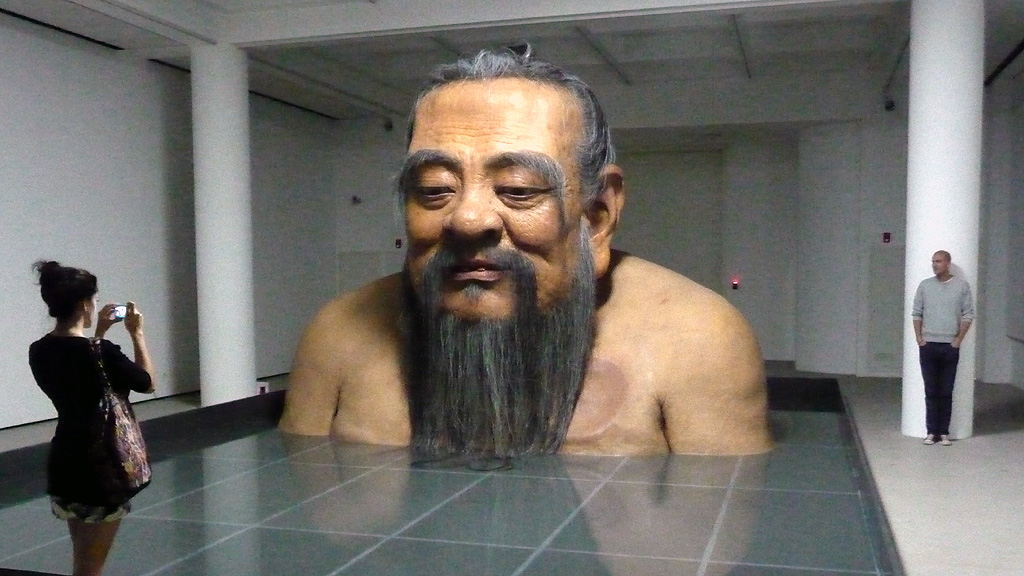
Installation with Confucius "Q Confucius No. 2" works of the modern Chinese artist of Zhang Huan. Photo from a site lazerhorse.org
did not correspond to any point, for as paid. However it took Confucius's sayings with itself(himself) in a grave (or they were put there by organizers of a funeral) as obligatory reading for the representative of the nobility of the time. Nakhodka confirmed once again available historical data: Confucianism started extending in the Chinese society during dynasty board Han whom Liu He treated also.
Earlier, at the first emperor Qin Shihuangdi, adherents of Confucianism were exposed to terrible repressions – views of government at the great dictator and followers of the great wise man categorically did not coincide. Emperors of a dynasty Han appeared more far-sighted: they turned Confucius's doctrine to themselves on advantage, and eventually Confucianism was cornerstone of the Chinese statehood.
For understanding of a historical context should addingthat in the I century B.C. when Liu He lived and died, Confucianism was not issued yet in uniform state ideology with initial texts. It occurred century later. For this reason of a set phrase of Confucius, found in Liu He's tomb, possess improbable value: they are of one of three early versions of the greatest heritage of Confucius – books " Lun Yu " known in the West as " Analekta's " .
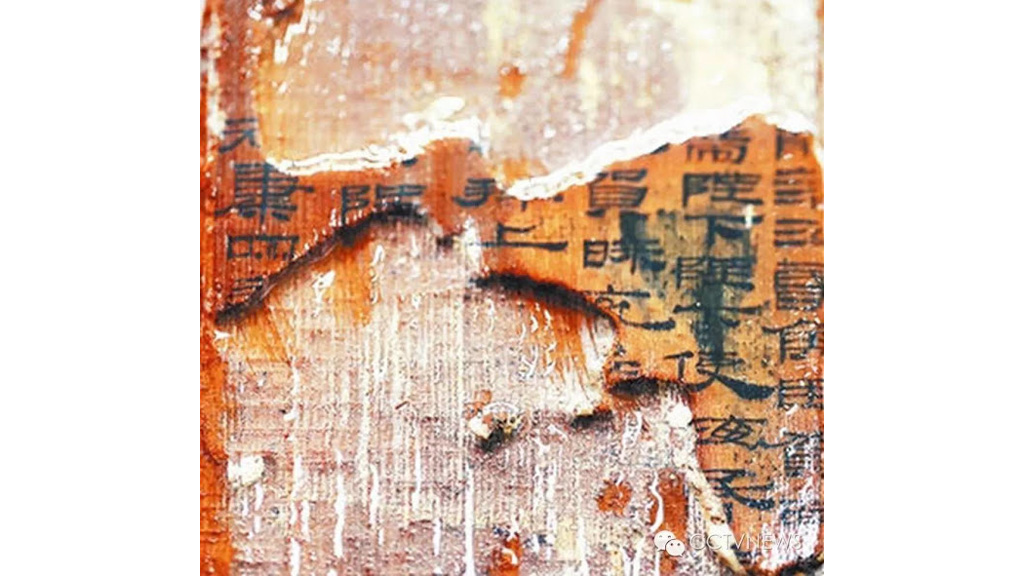
the Bamboo plate with a fragment of sayings of Confucius from Haihunhou's necropolis. Photo: CTV News
"Lun Yuy" or, in Russian translation, " Conversations and judgments " is a collection of quotes, oral statements, legends and Confucius's acts, made by his followers. Confucius wrote down nothing:" I do not create, but only I repeat studied", he spoke. The teacher Kuhn considered himself as the intermediary who is not inventing anything new, and only reporting to new contemporaries the doctrine of wise men of an antiquity and fruits of the communication with the world of spirits.
Drawing up "Lun Yuy" began p after Confucius's death and took nearly 50 years. The last two millennia this book was one of the most readable and esteemed in Heavenly Empire, the educated person was obliged to learn "Lun Yuy" by heart.
"Lun Yuy" it was created by pupils and Confucius's followers during an era of Battling kingdoms (475 - 221 BC) . At the first emperor Qin Shihuangdi the written-down set phrases together with people extending them endured the terrible period" burnings of books and burial of scribes ". By the beginning of distribution of Confucianism at a dynasty Han two versions "Lun Yu" were known, in the II century BC there was the third. The main difference between them – quantity of hieroglyphs and heads.
Two most ancient versions received the names "Set Phrases of a Kingdom of Lu" (Lu Lun, 20 heads) and "Set phrases of a kingdom of Qi" (Qi Lun, 22 heads). The third version, "Ancient set phrases" (Gu lun), according to the legend was found in a wall of the house of Confucius and, probably, was the earliest of all. It totaled 21 heads.
Still does not know towhat of three ancient versions was cornerstone of official (initial) edition. The modern option "Lun Yu" consists of 20 heads.
What of three versions it is found in a tomb of "the unaccomplished emperor" Liu He? Archeologists practically do not doubt that it is a question of the largest of them – Qi Lun's version, are reported by the Chinese mass media.
Qi Lun's Original was lost by p about 1800 years ago. If is confirmed that text breakdown on chapters corresponds to Qi's who has remained in late copies version, it becomes really epoch-making opening for China and world science.
Professor Xin Li Xiang (Xin Lixiang), the head of excavation of a necropolis Haihunhou, tells about a find with care peculiar to scientists. In his opinion, for final confirmation additional researches with application of modern technologies are required.
In Liu He's tomb found more than 5000 bamboo plates with hieroglyphs. Confucius's sayings were found not at once, they got lost between reports of officials, medical treatises and agricultural records. Xin Li Xiang explained that scientists finished analysis of plates and now are engaged in their preservation which will be finished by the end of the year.
the Main problem that else in the ancient time flooded a tomb, and all organic chemistry found in burial (including Liu He's remains) has rotting traces. Bamboo plates not exception. After completion of preservation experts will study precious records by a method of infrared scanning: the modern technology will help to identify unreadable symbols and most precisely to decipher the remained fragments for the full analysis of the text.
it is curious that it not the first artifact connected with Confucius from a tomb of "nechestivets" of Liu He. In November, 2015 archeologists declared an improbable find: in a funeral chamber the most ancient of Confucius's portraits, executed on a varnish screen was found.
"On a screen three portraits are distinguishable, signatures to them contain Confucius's names, his father Shulyan He and one of favourite pupils, Yen Hueya. Names directly enter on that one of three represented men – Confucius", – was told by one of heads of excavation.
the Screen managed to restore partially, but an artifact so valuable, and a varnish covering and a screen material so fragile that a unique portrait still did not show to general public and hardly he will participate in the exhibitions devoted to a necropolis of Haihunhou.
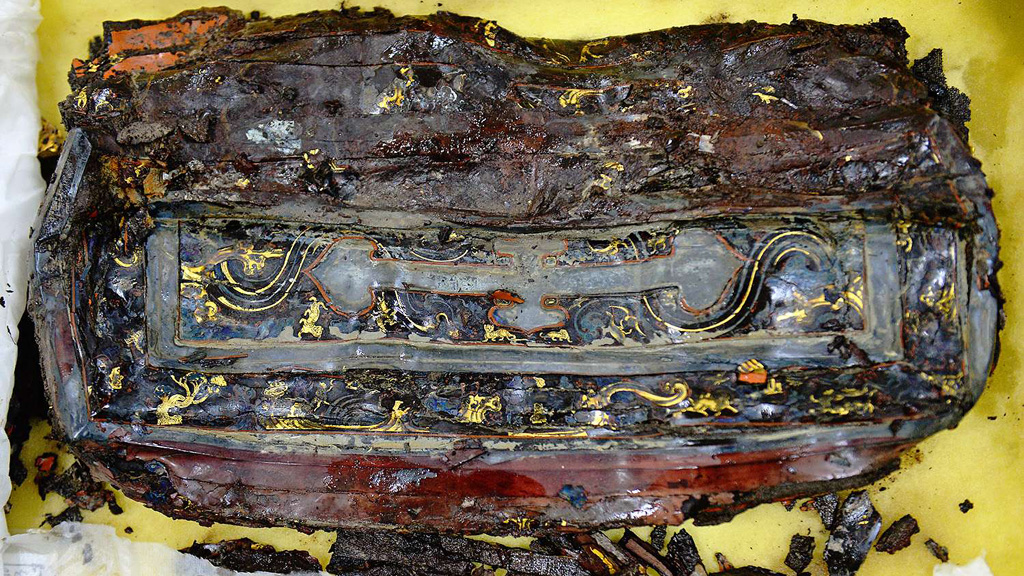
the Condition of a varnish casket (not screens), to Liu He found in a tomb. Photo: Xinhua
That would be told by the teacher Kuhn, having learned, what the greatest of the related artifacts come from a tomb of the most unworthy emperor of Heavenly Empire?
it is possible, would quote itself: "Having met the worthy person, seek to be made even to him; having met unworthy, penetrate in itself" (Lun Yu, 4:17).
